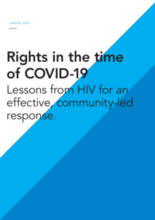As the world scales up public health responses to the COVID-19 pandemic, countries are being urged to take decisive action to control the epidemic and provide necessary services and diagnostics to the people who need them. Countries are being requested to take a comprehensive approach tailored to their circumstances, with containment as the central pillar. However, as in all acute epidemics, especially where casual person-to-person transmission occurs, there is a need to ensure that the response is grounded firmly in human rights.
Forty years of responding to the HIV epidemic has generated significant experience and lessons learned on the importance of a human rights-based approach to ensuring effective and proportionate responses to epidemics. Key among them is the need to have a community-centred and informed response, one that embraces solidarity and kindness, that prioritizes the most vulnerable and that empowers people to be able to take action to protect themselves and others from the virus. These are essential for creating trust between affected communities, the government and public health officials, without which it is unlikely the response with be either rapid or effective. Equally, swift action must not be rendered ineffective by existing inequalities, lack of information and barriers related to cost, stigma, privacy and concerns around employment and livelihoods.
UNAIDS has consulted with the HIV and Human Rights Reference Group, experts from civil society, academia and public health and other United Nations agencies to identify key learnings from the HIV response that are critical in ensuring an evidence-informed and effective response to an epidemic. The principles and considerations in this guide for a rightsbased and community-centred approach to addressing the COVID-19 epidemic are based on the outcomes of those consultations.

